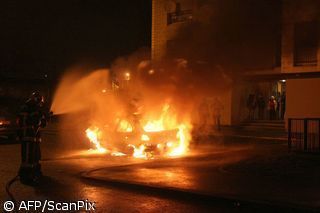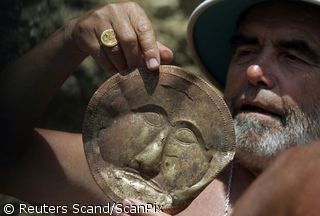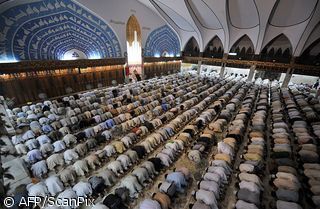European Union supporters in Latvia and Estonia expressed concern Thursday about a new survey pegging their countries as the most EU-skeptical in Europe
Published:
4 August 2003 y., Monday
European Union supporters in Latvia and Estonia expressed concern Thursday about a new survey pegging their countries as the most EU-skeptical in Europe—findings that come just two months before both Baltic states hold referendums on membership. A mere 32 percent of Estonians and 37 percent of Latvians agreed entry would be "a good thing," making them the most pessimistic of those questioned in the EU study released Wednesday. By contrast, 72 percent of Cypriots and 61 percent of Poles said joining would be good for them.
Latvia and Estonia will be the last of 10 EU candidate countries to put the issue of entry to a vote—and observers say there's now a chance that one or both nations could become the first to reject membership in Europe's most powerful multilateral club.
"People are afraid, they don't know what to believe and they're confused," said Pille-Mai Helemae, spokeswoman for the high-profile "Yes to the EU" group in Estonia. "It's going to be a hard fight. But in the end, I'm sure enough people will see more pros than cons to membership." Confusion about the EU was illustrated in the biannual Eurobarometer _ which questioned 1,000 people in each candidate nation in May—with 62 percent of Latvian and 71 percent of Estonian respondents saying they were either poorly informed about the accession process or not informed at all.
The Czech Republic, Hungary, Lithuania, Poland, Slovakia, Slovenia and Malta have already approved EU referendums, most by wide margins. Cyprus is leaving it's decision to lawmakers. If Estonia and Latvia pass their plebiscites on Sept. 14 and Sept. 20 respectively, they would join the EU together with the other candidates in 2004.
Virtually all top leaders in Estonia and Latvia have been pro-EU since the Baltic Sea nations regained independence—arguing that entry will raise their nations international stature, forge vital European trade links and boost living standards.
But official enthusiasm has never been matched outside the halls of power, with many Estonians and Latvians fearing a loss of sovereignty to the EU. Anti-EU groups compare what they say is an overly centralized EU with the U.S.S.R.; one of their symbols is an EU flag stamped with a Communist hammer and sickle.
If the results of the latest survey spooked EU supporters, they delighted opponents. "If you're a EU supporter, I believe the picture is even blacker," said Uno Silberg, who heads Estonia's "No to the EU Movement." "We're confident the referendum will fail."
Šaltinis:
balticsww.com
Copying, publishing, announcing any information from the News.lt portal without written permission of News.lt editorial office is prohibited.
The most popular articles
 Photographer Nigel Barker snaps top fashion models as they don boots to raise money to stomp out breast cancer.
more »
Photographer Nigel Barker snaps top fashion models as they don boots to raise money to stomp out breast cancer.
more »
 Revelers in El Salvador hurl fireballs at each other in a tradition marking the explosion of a volcano.
more »
Revelers in El Salvador hurl fireballs at each other in a tradition marking the explosion of a volcano.
more »
 Time to register for the 2010 edition of EU’s young translator contest.
more »
Time to register for the 2010 edition of EU’s young translator contest.
more »
 A six foot nine-inch tall Brazilian teenager dreams of becoming a model despite the challenges of her abnormal height.
more »
A six foot nine-inch tall Brazilian teenager dreams of becoming a model despite the challenges of her abnormal height.
more »
 Colombia fashion show promotes safe sex by dressing models in clothes made from 12,000 condoms.
more »
Colombia fashion show promotes safe sex by dressing models in clothes made from 12,000 condoms.
more »
 Could 36 million people across Europe die if a fictitious form of TB became a reality? A school in Colchester worked over an entire day to come up with a law to help prevent such a pandemic.
more »
Could 36 million people across Europe die if a fictitious form of TB became a reality? A school in Colchester worked over an entire day to come up with a law to help prevent such a pandemic.
more »
 The construction of a metro line in Mexico City yields the remains of 50 Aztec children and various clay artifacts.
more »
The construction of a metro line in Mexico City yields the remains of 50 Aztec children and various clay artifacts.
more »
 On World Humanitarian Day on 19 August, the European Commission honours humanitarian workers who have lost their lives or freedom, or have been injured during the course of their work.
more »
On World Humanitarian Day on 19 August, the European Commission honours humanitarian workers who have lost their lives or freedom, or have been injured during the course of their work.
more »
 The 19th of August marks the World Humanitarian Day, which is designated by the United Nations (UN) to honour international humanitarian aid workers who were killed or injured in the cause of of duty.
more »
The 19th of August marks the World Humanitarian Day, which is designated by the United Nations (UN) to honour international humanitarian aid workers who were killed or injured in the cause of of duty.
more »
 The holy month of Ramadan begins around the world.
more »
The holy month of Ramadan begins around the world.
more »